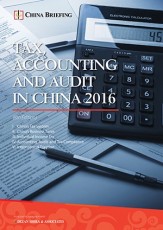Inflicting Loss on Investors through Cooked Books: Assessing Accounting Fraud in China
 By Dezan Shira & Associates
By Dezan Shira & Associates
Editor: Mia Yiqiao Jing
Accounting fraud in China seldom made headlines until the U.S. Securities and Exchange Commission (SEC) recently began probing Chinese e-commerce giant Alibaba’s accounting practices. Although accounting fraud is a global issue, China’s investment climate presents higher risk because local companies often want to exaggerate their revenues to increase marketing power and investor interest.
As more foreign investors seek to capitalize on China’s rapidly growing middle class and the country’s energy industries, we look at common issues of accounting misconduct in China and the recent amendments released by the International Accounting Standards Board (IASB) to help investors better understand an entity’s business state before making important decisions.
Common Accounting Fraud Practices in China
Accounts Receivable
The easiest way to drive up profit in the current fiscal year is to arrange credit transactions with affiliated entities. Credit transactions don’t reflect on statement of cash flow substantively; rather, they generate deceptive accounts receivable that mislead investors’ decision-making. Once investment decisions have been made, companies can have their affiliated entities return purchases in the next fiscal year.
The e-commerce industry in particular exploits sale loopholes since investors usually find it difficult to keep track of return and cancelled orders. The situation worsens when business modes are complicated, as in the case of Alibaba, who dominates both China’s online B2C and C2C business. It is almost impossible for the public to figure out whether profit hikes reconcile with industry trends and whether Alibaba’s affiliated entities participate in corruption.
 RELATED: Tax and Compliance Services from Dezan Shira & Associates
RELATED: Tax and Compliance Services from Dezan Shira & Associates
Bad Debt Reserve
Another black hole that companies target is the bad debt reserve, which carries a higher chance that entities might not collect the full amount of revenue due to customers’ financial difficulties such as bankruptcy and unbalanced cash flows. When preparing financial statements, entities have to cross out bad debt under a self-determined ratio, lowering the year-end profit. This is where misconduct comes into play when management wants to inflate profits. By recording less bad debt than actual, or by using smaller bad debt probabilities, foreign investors are misled with manipulated accounts receivable, increased annual profitability, and raised stock prices.
Managers usually determine the ratio of bad debt based on the average age of accounts receivable; if the age is too long, it is likely that companies will not collect the bad debt on time. Unfortunately, some private firms fail to disclose the age of accounts receivable, neither do they report the true number or explain how the ratio of bad debt is determined, putting their business performance in doubt.
Fixed Assets
Entities could overstate the costs of initial investments such as fixed assets to transfer the raised capital for personal use, or embezzle cash from selling fixed assets instead of compensating investors. Entities could also understate the fixed asset depreciation age to lower annual expenses. Fixed asset due diligence is necessary to identify discrepancies.
Ability to clear off debt
The current ratio and the liquidity ratio are used to estimate an entity’s ability to clear off debt. However, these two measurements don’t necessarily tell accurate stories of whether an entity holds sufficient cash to support operating activities. By manipulating profit levels, companies increase stock prices and collect cash from purchased shares; the cash obtained proves credibility and is eligible for long-term debt to bolster operating activities. Once investors are hidden from sources of cash inflows, a merger and acquisition becomes a trap where the new management team is now responsible to pay off the debt collected by subsidiaries.
In practice, personal interest is the most important driving factor behind accounting fraud, and cash is the most accessible ingredient for individuals to cook. In large-scale companies where hierarchical corporate cultures dominate, subordinates face a dilemma between losing their jobs and maintaining business ethics. Under the pressure of competition between regional departments, management teams frequently set unrealistic targets, and long-established business networks with local suppliers or officials give them incentives to play with numbers. For small-scale and private companies, internal control is inadequate due to the lack of government supervision and poor segregation of duties.
IASB Amendments on Financial Statements
Operating Leases
Facing irreversible losses inflicted on investors, the IASB is putting more restrictions on financial disclosures and giving more clarifications on an entity’s liability. Starting 2019, the present value of all lease payments (excluding short-term or small-valued contracts) will be recognized as a lease liability, and will need to be recorded on the balance sheet. Changes on internal controls such as document maintenance, data collection, determination of whether a service contract meets the definition of a lease, and tax calculation will be expected.
Challenges still exist. According to the IASB, currently, over 85 percent of lease liabilities worldwide are not recorded on the balance sheet, since it is not compulsory under the current accounting standards. Furthermore, investors are unaware of whether entities have held long-term leasing commitments, which may transition to enormous debt during an economic crisis. In cases where other operations claimed by a corporation are in fact its principal ones, management teams can conceal a great amount of liabilities, including leases required for the so-called “other operations” since they are not reported on the balance sheet, thereby confusing investors’ judgement on an entity’s overall liability. That said, companies might rewrite long-term leases into several short-term ones and still manage to hide their lease obligations from investors.
![]() RELATED: Understanding China’s Accounting Practice: Chinese GAAP vs. China’s Tax System
RELATED: Understanding China’s Accounting Practice: Chinese GAAP vs. China’s Tax System
Liabilities arisen from non-cash financing activities
The Statement of Cash Flow identifies sources of cash and how they are being used. An influx of cash or positive ending balance can’t determine business sustainability alone. In practice, entities can keep liabilities obtained through a previous acquisition hidden to new investors since only financing activities involving cash such as borrowing are reported following current accounting standards.
Effective in 2017, entities will be required to record non-cash financing activities to better reveal movement in debt, which include foreign exchange gains or losses. With the new policy allowing for more flexible RMB conversion for mainland-based non-financial institutions, we expect companies who hold large foreign currency reserves to take advantage of this policy by capitalizing on low exchange rates. Changes from foreign exchange maybe subtle, but they implicate an entity’s tendency to increase liquidity or issue shares or bonds on cross-board listings.
According to the IASB, the amendments are subject to change in consideration of the variety of opinions generated from its international members. Local business networks, a complex corporate culture, and language barriers interfere with foreign investors’ decision-making capacity. Most importantly, how foreign investors trace back losses incurred before mergers and acquisitions and joint ventures remains unanswered, and such losses could have long-term effects on a company’s reputation. Going forward, more reforms increasing transparency on financial disclosures without violating confidentiality can be expected, enabling deeper joint inspections that give investors fairness and confidence in making investment decisions.
|
Asia Briefing Ltd. is a subsidiary of Dezan Shira & Associates. Dezan Shira is a specialist foreign direct investment practice, providing corporate establishment, business advisory, tax advisory and compliance, accounting, payroll, due diligence and financial review services to multinationals investing in China, Hong Kong, India, Vietnam, Singapore and the rest of ASEAN. For further information, please email china@dezshira.com or visit www.dezshira.com. Stay up to date with the latest business and investment trends in Asia by subscribing to our complimentary update service featuring news, commentary and regulatory insight. |

 Tax, Accounting, and Audit in China 2016
Tax, Accounting, and Audit in China 2016
This edition of Tax, Accounting, and Audit in China, updated for 2016, offers a comprehensive overview of the major taxes that foreign investors are likely to encounter when establishing or operating a business in China, as well as other tax-relevant obligations. This concise, detailed, yet pragmatic guide is ideal for CFOs, compliance officers and heads of accounting who must navigate the complex tax and accounting landscape in China in order to effectively manage and strategically plan their China-based operations.
 Annual Audit and Compliance in China 2016
Annual Audit and Compliance in China 2016
In this issue of China Briefing, we provide a comprehensive analysis of the various annual compliance procedures that foreign invested enterprises in China will have to follow, including wholly-foreign owned enterprises, joint ventures, foreign-invested commercial enterprises, and representative offices. We include a step-by-step guide to these procedures, list out the annual compliance timeline, detail the latest changes to China’s standards, and finally explain why China’s audit should be started as early as possible.
Managing Your Accounting and Bookkeeping in China
In this issue of China Briefing, we discuss the difference between the International Financial Reporting Standards, and the accounting standards mandated by China’s Ministry of Finance. We also pay special attention to the role of foreign currency in accounting, both in remitting funds, and conversion. In an interview with Jenny Liao, Dezan Shira & Associates’ Senior Manager of Corporate Accounting Services in Shanghai, we outline some of the pros and cons of outsourcing one’s accounting function.
- Previous Article Weathering China’s Cloud Computing Regulations
- Next Article Meat’s off the Menu: Exploring Opportunities for Meat Alternatives in China










